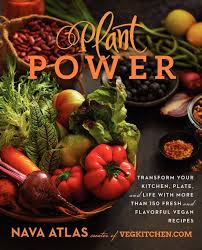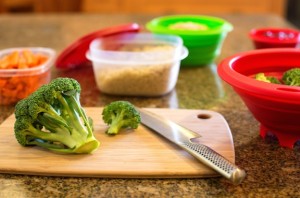 Excited to host this post for Nava Atlas’s new book blog tour. Not only did Nava share strategies for planning meals in the plant-based kitchen here, but you can also win a FREE copy of her brand new, gorgeous book, Plant Power, below. Nava is a talented, inspiring author and illustrator of many books on vegan and vegetarian cooking, most recently Wild About Greens and Vegan Holiday Kitchen. She runs VegKitchen.com, one of the leading web resources for vegan recipes and lifestyle tips. In addition to her food writing, Nava also produces visual nonfiction and is a visual artist. Her work has been shown nationally in museums and galleries, and is part of numerous museum and university collections. You can see her work at navaatlasart.com.
Excited to host this post for Nava Atlas’s new book blog tour. Not only did Nava share strategies for planning meals in the plant-based kitchen here, but you can also win a FREE copy of her brand new, gorgeous book, Plant Power, below. Nava is a talented, inspiring author and illustrator of many books on vegan and vegetarian cooking, most recently Wild About Greens and Vegan Holiday Kitchen. She runs VegKitchen.com, one of the leading web resources for vegan recipes and lifestyle tips. In addition to her food writing, Nava also produces visual nonfiction and is a visual artist. Her work has been shown nationally in museums and galleries, and is part of numerous museum and university collections. You can see her work at navaatlasart.com.
7 Simple Meal-Planning Strategies for the Plant-Based Kitchen
Here are some of my tried-and-true meal-planning tips for making cooked-from-scratch meals a daily reality, even after the most exhausting days. You’ll find much more detail on how to accomplish all of these strategies, plus lots more of these kinds of tips in Plant Power: Transform Your Kitchen, Plate, and Life with More Than 150 Fresh and Flavorful Vegan Recipes by Nava Atlas, from which this was adapted (©2014, published by HarperOne, reprinted by permission). Photos by Hannah Kaminsky.
Back when my kids were growing up and I still was in the midst of the classic juggling act, I was a lot more disciplined about meal planning. I found that it really did buy me time and sanity. For our family of four, I planned three meals per week. If I made ample quantities, I could count on leftovers for three more dinners. And leftovers can always be tweaked so that they’re slightly different the next day. For example, today’s salad can be tomorrow’s wrap; tonight’s soup-and-wrap dinner can become tomorrow’s soup-and-vegan-quesadilla dinner.
What do you see as your ideal meal-making style? Decide whether you want to make different meals every night or most nights and rotate them through the season or whether you want to try the three-meals-with-leftovers strategy. If you want to be a seat-of-the-pants cook, more power to you. For that kind of spontaneity, you’ve got to have an especially well-stocked pantry and fridge as well as the imagination to look at a bunch of ingredients and envision what they can become.
1. Plan three full meals for each week. From those meals, you can plan two nights of leftovers, which makes life easier—though this is challenging if you have hungry teens or athletes at home. Don’t think of leftovers as boring. They can be repurposed in ways that might not make it into the culinary hall of fame, but with a few tweaks they can be as tasty as the original preparation. For instance, leftover chili can become Cincinnati chili mac.
2. Plan meals before going shopping. Planning your meals before you go food shopping will ensure that you don’t waste time, money, and energy running back and forth to the store all week. A mere twenty to thirty minutes of meal planning per week will simplify your life immeasurably, especially if you have a tight schedule, young children, or both.
3. Plan meals after going shopping. What? Didn’t I just say to plan meals before going shopping? Sometimes it’s good to think outside the box. When farm market or CSA season is in full swing—or during the summer and fall harvest season in general—and you’re getting basket loads of fresh produce, it may be wiser to retrofit your meal plans to your fresh food finds.
4. Prepare a few basics for the week ahead. On whatever day or evening is the most home- centered, prepare a few basics for the days ahead. Sunday afternoons and evenings are ideal as you’re looking to the coming week, but do whatever is good for your schedule. Even the simplest things can ease weeknight meal preparation immeasurably.
5. At least once a week, prepare a big one-pot or one-pan meal. This kind of meal can stretch to cover at least two nights. Such meals include hearty soups and stews, bean dishes, abundant pastas, and casseroles. You’ll find many such recipes later on in this book. Double the quantities if you need to, especially if you have a large family. Then you need little more than salad and fresh whole-grain bread to accompany the meal.
 6. Develop a weekly repertoire. Make slight variations on your standard recipes each week so that meals don’t get boring. For example, Friday dinner has long been a pizza and salad meal, but within this basic framework, there are endless variations!
6. Develop a weekly repertoire. Make slight variations on your standard recipes each week so that meals don’t get boring. For example, Friday dinner has long been a pizza and salad meal, but within this basic framework, there are endless variations!
7. Create a seasonal repertoire. An alternative to a weekly repertoire is a seasonal repertoire, consisting of ten or fifteen basic meals that you like best. These ten tasty meals— one for each weeknight for two weeks—are repeated as needed throughout the season. Weekends can bring a heavenly leftovers buffet. That doesn’t sound too daunting, right?
***Enter to win a FREE copy of Plant Power here: a Rafflecopter giveaway




This Post Has 20 Comments
Excellent ideas to streamline our precious, non-renewable resource ~ time. Look forward to reading Nava's book!
~jsk | Boulder, CO
Soups, especially this time of year, in a CrockPot can be very healthy and very helpful!!!!
great tips!
i like to make enough dinner for two nights, but freeze the leftovers and then defrost in a week or two for another night's meal. There's nothing like leftovers. It's instant dinner!
I like to make extra portions.of healthy meals and freeze them for when time is harder to come by.
I like to make stews and soups that will last at least a week.
A freezer — I always keep things in there to pull out when we are in a big rush. I am trying to get better at the planning though!!
Great tips!
I can't really I am terrible at this, we make a lot of soup and that helps but more often than not I find myself asking "what sounds good for dinner" only to be greeted with the dreaded… " I don't know". So yes something I really NEED to work on. Thanks for the chance to win!!
I have used your suggestions for meal planning for the past three years and it saves me time at the store, time in the kitchen and we have fewer, "oh, let's get vietnamese food" days when the inspiration to cook doesn't arise.
Be flexible! Which is why I like your tip to plan meals AFTER shopping as well. Maybe things ran late and you don't have time to do what you originally planned to… in that case, fall back to a fast alternative. I look forward to more ideas and fabulous recipes form Nava's book!
Around the holidays, get together with friends for a soup swap. Everyone brings a big pot of soup and some extra containers. Eat together, then fill the containers with what's leftover. You'll go home with wonderful soups to freeze and pull out when you're pressed for time during the run-up to the holidays.
This is something I'm really needing help with. My family has been trying to learn how to eat this way but it's not as easy as it sounds when you have spent your entire life eating meat and dairy.
Don't buy junk! Don't bring it into your house. Fill your frig, freezer and pantry with whole foods.
Spending Sunday afternoon chopping veggies, roasting veggies, cooking rice, etc. makes the week much easier for cooking!
Well, for me and my meat eaters, a salad always works…but I also add a lot of side dishes to add to the salad so that each one can be different…..almost like at a salad bar….it seems to make it their specialty!
I like to prep a pot of rice or quinoa, then add some beans and cooked veggies or a salad for a quick meal. Nothing too fancy. A quick pasta with store-bought marinara sauce and some steamed broccoli is also a good quick meal.
Beans, greens, and sauce! Always avaiable, always nutritious, always yummy!
Have a fully stocked pantry (lots of beans, pasta, flour) and cooked brown rice or quinoa on hand (or freezer). Always try to plan the next four days.
Get rid of sugar in your diet